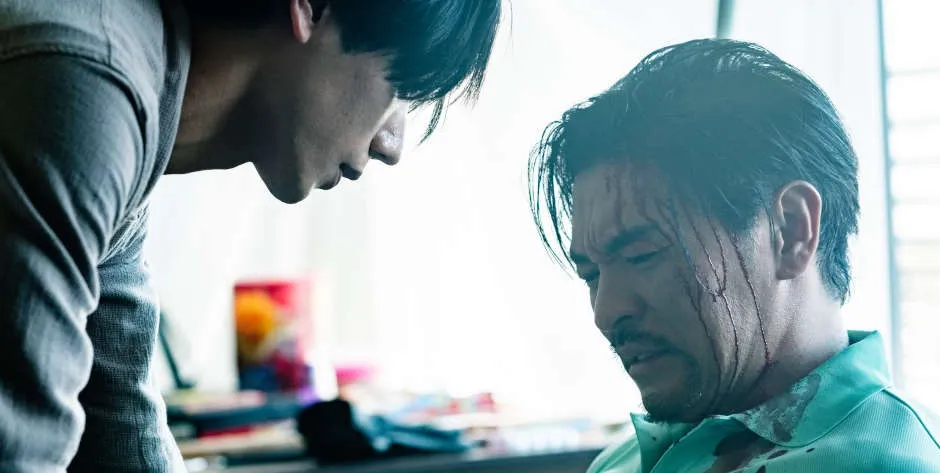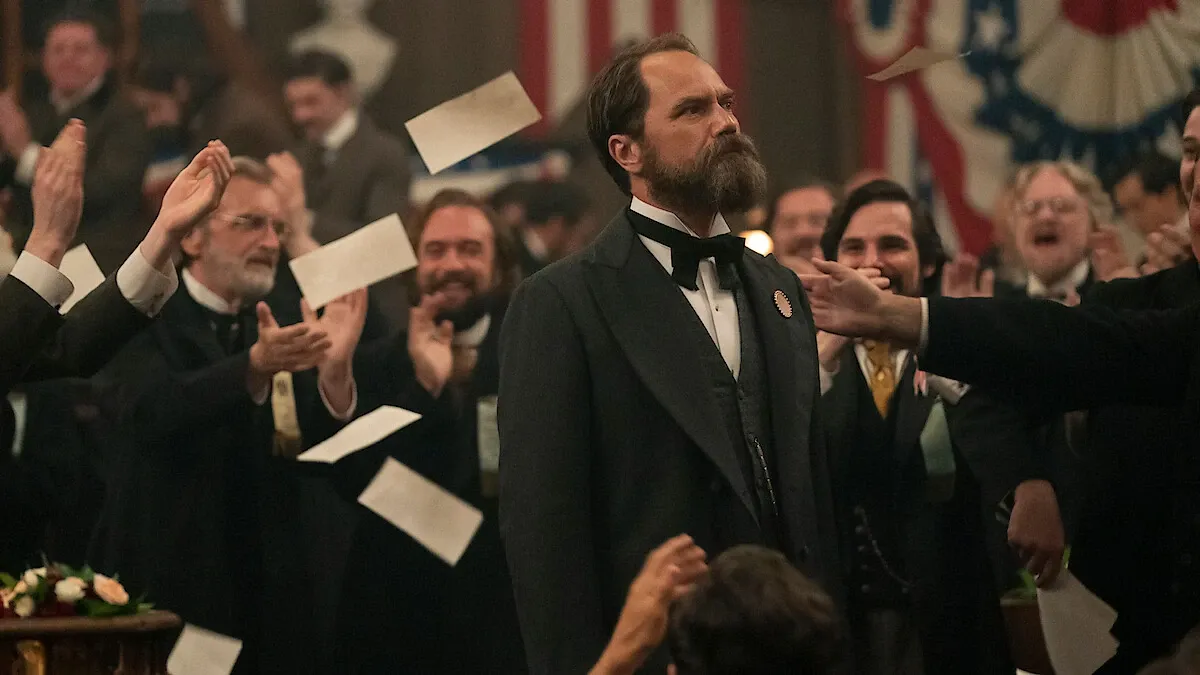Premiering on April 9th on Amazon Prime Video, THEM is a horror anthology series from creator Little Marvin and executive producer Lena Waithe. Set in the 1950s during the time of the great migration, the Emory family settles into a white suburban neighborhood of Compton in Los Angeles. Before they know it, hostile forces, both real and supernatural, begin to torment them.
To bring his vision to life, Marvin recruited around him a cast and crew of genre regulars. British actors Deborah Ayorinde and Ashley Thomas took over as the leads, Lucky and Henry Emory. Newcomer, but already a genre veteran, Shahadi Wright Joseph joins them as their daughter, Ruby, who is at the center of the traumatic events. As the mysterious Ella Mae, Marvin found the talented Anika Noni Rose. Alison Pill rounds out the cast as the hateful and tormented Betty, whose intolerance leads to devastating consequences.
I got a chance to attend a roundtable discussion with each of them to talk about how the series came to be and what we can expect going in.
(This interview has been condensed and edited for clarity.)
“I’ve always thought that since the dawn of the United States, there’s been a THEM.”
Little Marvin, Showrunner
The Influence
From the opening sequence onward, it’s clear that THEM is a highly stylized and vibrant take on serious material. None more apparent than in the arrival into Oakland, where the pastel-colored grass and painted houses contrast starkly with the occupants’ barely concealed bigotry.
LITTLE MARVIN: I’m a huge fan of David Lynch. BLUE VELVET, in particular, is one of my all-time favorites. It has a wonderful and weird way of taking you underneath the nightmare beneath the sunny suburban atmosphere. That has always inspired me, and we try to pay homage to it.
The irregular narrative, complete with unreliable narrators and shifting points of view, is more contemporary than the minimalist, almost stagey works of the 50s.
MARVIN: We wanted to make a show about the 50s that looks like it’s shot in the 70s. The hope was to find an anachronistic feel.
There are numerous tips of the hat to the experience of living in Los Angeles, which always feels removed from reality. The opening credits, for example, bring to mind Alfred Hitchcock collaborator Saul Bass. The same meticulousness extends to the music choices, ranging from 50s daytime tunes to West Coast rap of the early aughts.
MARVIN: I’ve been a lifelong fan of everyone from Hitchcock onwards, but from day one, when I started writing it, it came to mind that it needs to be shot this way. I knew the opening credits had to be Saul Bass. Our music coordinators, Justin Hopfer, and Megan Currier were absolutely fantastic. Once we knew we would hold hands with this anachronistic vision, it opened up our use of music in a way we couldn’t have done. So to be able to play with the music was a huge gift to us. There was already music in the scripts that I knew I wanted to use at very specific points. With horror, for me, there’s no way to divorce music from the vision.
Where do you begin with your process of bringing the script to life and finding the characters? At least the dynamics and chemistry between everyone felt very real.
ANIKA NONI ROSE: The piece is so extensive that it moves through so many things and elements. Some of them I know from being a black American; growing up here and listening to my parents and grandparents, reading history. They’re things I found that I felt lined up with whom this character was.
SHAHADI WRIGHT JOSEPH: The first day we met, we were so excited to get started. We went out to dinner and had a genuine conversation about school, life, relationships, and everything. It was a great place to start this bonding relationship. Our chemistry was very natural, and after shooting the first episode, it felt close to a real family.
The past five years have seen a new rise of black filmmakers in mainstream American cinema. Most notably in the works of Jordan Peele and LOVECRAFT COUNTRY, released last year. Are genre films a lens that allows the cast and crew to communicate horrific scenarios a little easier?
MARVIN: I find it interesting that so many of us black filmmakers are drawn to horrors and thrillers to tell our stories. It says a lot about the country and our relationship with art. I hope that there will be more of these stories; I think the genre has an amazing opportunity to couch social issues in a way that you want to watch.
ROSE: I think that Little Marvin was able to take these real-life issues that people still deal with and put them into this space was pretty brilliant. He needed some supernatural element to be able to take in everything that is going on. Sometimes, things in life are so absolutely terrifying that they need another lens to look at them. We hope it’s supernatural or something outside human beings’ power because why would anyone act that way toward others?
JOSEPH: Little Marvin wanted to express the everyday microaggressions and create a world where they’re magnified a hundred times over. It is an easier way to express how those scenarios feel.
MARVIN: As a straight drama, THEM would probably be too hard to swallow. But when it’s wrapped in a package like this, it allows people to enjoy it in a way.
The reality of THEM is all too topical today, as anyone who looks at news coming from America will know. Finding a reference point couldn’t have been too hard, but it certainly must not have been easy to differentiate between fiction and reality.
ALISON PILL: Unfortunately, it is very easy to find inspiration and context, and the mindset for white supremacy every single day. The policing of black people and their bodies by white women, through the systems that I live in daily, makes it impossible for me to avoid this mindset. It’s this way of thinking, this entire system, this culture. The distance traveled between 1953 exists, and it’s shocking how little has been done. I think about the white women who’ve been calling the cops on their neighbors and are doing it today. I wish it were harder to find inspiration for a character like this, but all it takes is opening the news app.
JOSEPH: It is very heavy [because of what’s happening in America today]. Especially for me, being a little bit younger. Sometimes doing the heavy scenes, your mind can’t differentiate between you and the character. I’d try to unwind after filming because it’s not healthy if you can’t separate yourself from that.
Where do you go to find a character so far removed from who you are? Is there a point of empathy or even dark humor within the material that helps?
ROSE: That’s a really good question. It depends on the role and space. Somebody might have read this and interpreted Ella Mae as something completely different. For me, it was a space that tickled the back of my mind: It felt right for what was going on. It’s not something I search for. I think it ultimately comes out of the truth about where you are and your character. I hope that it reads that way.
PILL: I really was interested in her voice and her smile. That was how I found my way in. She’s overly polite, and smiles a lot, even as she stabs you. This idea of white women’s violence being this place of politeness. This allowed me to say the most hateful things you can imagine with a smile, very politely and nicely. It was the most interesting way to portray her since women’s fear, and white women’s proximity to their own power plays out in this realm between manipulation and fear, and frustration beyond their own inability to move beyond their caste.
Shedding the weight
When working on a project like this, a period piece dealing with topical issues, is there a temptation to bring modernity to the performance? Or do you approach it as an emulation of the past and trust in the truth to come out?
ROSE: I think it’s very important to hold on to the time period you’re in. I think that, if it’s done well, people will recognize the right now in what you’ve done. But one thing that really bothers me is seeing period pieces with contemporary behavior in them. I think it blurs things. It doesn’t allow people to learn the same way. I try to be as true to a time as I possibly can. It takes me as a viewer out of it. If something slips, it’s not because I didn’t do the work to stay in that space. I consider it lazy not to have done that.
PILL: It was helpful to have the costume and the wig because Betty’s deconstruction is so lengthy and extreme. Her armor is the garter, corset, everything. By the time they removed it, and I was back in my clothes, it was such a different feeling. When I got home on my last day, I had to go straight to bed for some time because my body just dropped. I was so exhausted. All of the effects of even touching on the fear and violence and horror of portraying things weighed heavily on me. And it wasn’t until I shed the costume for the last time that it lifted.
ROSE: Sometimes there’s a catharsis in a role [like this]. At least in knowing that I can take this person and situation off and go home. And when I leave it, hopefully, I have shown someone else something of themselves. Something they didn’t recognize before. Maybe it will throw up a mirror and assist them in changing things. It allows me to move through this type of hell, and it is not my own personal torment when I return home.
And who are the “Them” in the title?
MARVIN: I’ve always thought that since the dawn of the United States, the US, there’s been a THEM. There’s a marginalized group that’s received the ire and hatred of the dominant groups. It’s up to the viewer to decide who the THEM in our show is. I want the viewer to have a relationship with this word.












